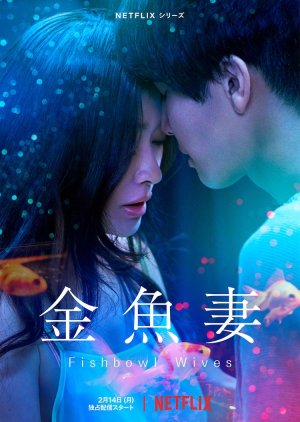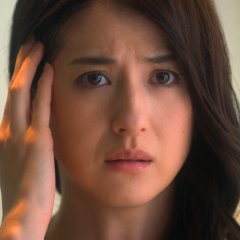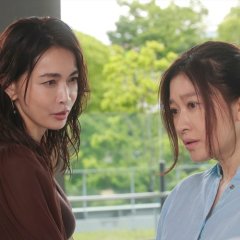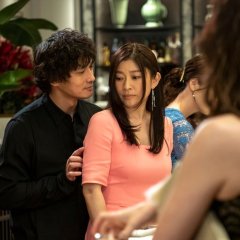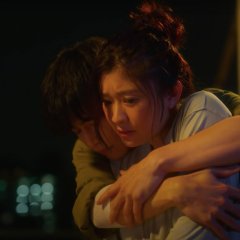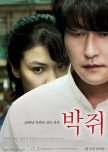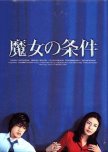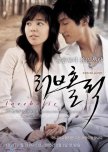~~ Adapted from a manga of the same name. Modifica la Traduzione
- Italiano
- 中文(台灣)
- Arabic
- Українська
- Titolo Originale: 金魚妻
- Conosciuto Anche Come: Goldfish Wife
- Sceneggiatore: Tsubota Fumi
- Regista: Matsuyama Hiroaki, Namiki Michiko
- Generi: Romantico, Drama
Dove Guardare Kingyo Tsuma
Subscription (sub)
Cast & Ringraziamenti
- Shinohara RyokoHiraga SakuraRuolo Principale
- Iwata TakanoriToyoda Haruto [Owner of "Toyoda Goldfish"]Ruolo di Supporto
- Ando MasanobuHiraga Takuya [Sakura's husband]Ruolo di Supporto
- Hasegawa KyokoHakozaki Yuriha [The renovation wife, room 1803]Ruolo di Supporto
- Minemura RieMei [Fortune teller]Ruolo di Supporto
- Minakami KyokaBando Masako [Haruto's ex-girlfriend / Lawyer]Ruolo di Supporto
Recensioni

Questa recensione può contenere spoiler
I pesci rossi non possono andarsene da soli
Un edit prima di iniziare: oggi ho visto "An Affair" del 1998 di E J-yong, con Lee Jung-jae. Ha moltissime somiglianze con questa serie giapponese, non è possibile che siano mere coincidenze: anche lo stile, il carattere dei personaggi, il finale, la vasca dei pesci… Secondo me l'autrice del manga e la sceneggiatrice si sono ispirate proprio a questo film, ampliando la storia per una serie. Me ne sono accorta verso la metà del film.È una storia di corna. Tutti tradiscono tutti ed è la più tragica rappresentazione di quanto possa essere disfunzionale il matrimonio inteso come convenzione sociale, come ancora in parte succede in Giappone, quando è una sistemazione economica e sociale per entrambi, spesso combinato dalle famiglie, in una cultura in cui il cittadino deve lavorare e procreare per l’equilibrio della società.
Le mogli sono pesci rossi in bocce di vetro, considerate dai mariti un mero ornamento e semplicemente trascurate, intrappolate socialmente in una situazione da cui non è accettabile scappare. Come spiega la similitudine dei pesci rossi, “non possono andarsene da soli, hanno bisogno di essere aiutati… prima di tutto bisogna osservarli… quando appaiono i sintomi di una malattia, spesso è già troppo tardi…”. In una società in cui il nubilato e il divorzio sono entrambi malvisti, paradossalmente il tradimento è dato quasi per scontato e il protagonista, che accoglie nella sua casa e nel suo letto la donna in fuga dal marito, si considera quasi un benefattore. Anche gli altri uomini, a pensarci.
Tutto il dolore di queste donne può essere riassunto dalla frase che una di loro, depressa, dice al marito, che lavora come un pazzo per garantirle un alto tenore di vita: “Non ti ho sposato per diventare ricca, ma per passare più tempo con te”. Come cantava Mia Martini, “gli uomini ti danno tutto quello che non vuoi”.
A questa miseria relazionale la storia intreccia l’altra grande sofferenza della posizione sociale, simboleggiata dal piano del condominio dove tutti abitano. Il primo episodio inizia con la festa di compleanno della coppia “migliore”, che abita al 43° piano e ha invitato solo quelli dal 30° piano in su. Relazionalmente invece sono la coppia peggiore: lui è un traditore seriale, la maltratta e addirittura le mette le mani addosso.
La serie è quasi perfettamente suddivisa tra trama orizzontale e trame verticali. Ogni episodio porta avanti la storia insensata tra una 49enne sposata scappata di casa e un 33enne che la ospita nella sua mansarda sopra al negozio di pesci rossi, e nel contempo racconta l’infelicità di una delle altre coppie, mostrando la crudezza bestiale di rapporti sessuali infedeli, colpevoli e prepotenti. Ognuna delle mogli subisce un diverso tipo di costrizione: il marito la obbliga ad avere rapporti con un altro, oppure la tiene come terzo incomodo nella convivenza con la madre/suocera, oppure la rifiuta perché non vuole figli… Tutte sono ugualmente invisibili e trascurate, tenute lì come un pesce rosso in una boccia, appunto. E tutte si vendicano e si realizzano andando a letto con un altro, spesso anche lui sposato.
Come in questo dialogo tra due amanti, entrambi sposati:
LUI: La propria moglie è la creatura meno desiderabile.
LEI: E quale sarebbe la più desiderabile?
LUI: La moglie di un altro.
Questa recensione ti è stata utile?

Marshmallow-Chocoholic
40 persone hanno trovato utile questa recensione
‘Fishbowl Wives’ ; A Worthwhile Watch, Or A Waste Of Precious Time?
‘ Kingyo Tsuma’ ( alternatively known as ‘ Fishbowl Wives’ or ‘ 金魚妻’) is adapted from the eponymous psychological work by Kurosawa R . A mature and a surprisingly dark insight at times into the world of marriage, affairs and domestic abuse, ‘ Kingyo Tsuma’ is an intriguing if somewhat unrelieved portrayal into the fishbowl-like environment of main female lead Sakura Hiraga ( Shinohara Ryoko).
Hiraga is seemingly living the dream. She’s married to affluent hair stylist Hiraga Takuya( Ando Masanobu), she lives in an opulent penthouse apartment and she is envied by almost everyone that she knows.However as the saying goes: the grass is always greener on the other side of the fence.
Unbeknownst to others, the seemingly perfect Sakura Hiraga is an abuse-victim. Attacked physically and verbally by her husband on a regular basis, Hiraga likens herself to a goldfish stuck in a fishbowl; trapped in an inescapable situation with no way out.
It is due to her fascination with goldfish that Hiraga ends up encountering Toyoda Haruto ( Iwata Takanori). Toyoda is a kindhearted and younger man who owns a pet shop. After becoming enamoured by Hiraga, the female lead begins to question whether Todoya could be the key for her escaping from her megalomaniacal husband.
Screenwriter Tsubota Fumi has numerous works accredited under her name. Previously having worked upon ‘ Will I Be Single Forever ?’ (2021), Ojisan wa Kawaii Mono ga Osuki’ (2020) and ‘ Colorful Love: Genderless Danshi ni Aisareteimasu’ (2021), Fumi has notably had previous experience with adapting or writing somewhat “ avant garde” or unconventional screenplays.
This isn’t to entirely critique Fumi’s screenplay or the leadership of directors Matsuyama Hiroaki ( ‘ Mystery To Iunakare’, ‘ Switched’, ‘ Nobunaga Concerto’ ) and Namiki Michiko ( ‘ Mirai Nikki’, ‘Soredemo, Ikite Yuku’, ‘ Ichikei no Karasu’). The series did an excellent job through the writing reigns of Fumi and Hiroaki and Michiko’s lens perspective of making viewers feel uncomfortable during key moments. The topics exploited onscreen particularly revolving around infidelity, debauchery and domestic abuse could often purposefully make the viewer feel almost voyeuristic.
In addition to this it was apparent that ‘ Fishbowl Wives’ offered some wry and witty attempts at comic relief- a droll comic exchange or setup evidently drawing attention away from tense or angst-ridden moments in the series. However where ‘ Fishbowl Wives’ could admittedly feel somewhat limited was through the direction of writing .
The performances given by the main cast are certainly solid, with Shinohara Ryoko and Iwata Takanori particularly stealing the spotlight during tense or tour de force moments.
On the other hand whilst both leading actors’ idiosyncratic performances were certainly good, the onscreen chemistry between Ryoko and Takanori was admittedly somewhat stunted and inconsistent in parts .
Perhaps this isn’t entirely the fault of the actors. Whilst there is supposed to be an awkward barrier between their onscreen characters due to their respected age gap, it was often hard for viewers to truly engage with this “ developing” relationship due to the characters rarely having a lot of personal drive. ( Particularly with Sakura Hiraga. Although the female lead does develop and does make some life-changing decisions, there were many elements surrounding her seeming “ disregarded” dreams, her first meeting with Takuya as well as trauma which were often widely disregarded and limited opportunities in order to flesh out her character.)
Naturally this also had a knock-on effect with the plot. One of the focal and major drives of ‘ Fishbowl Wives’ narrative came through Hiraga and Haruto trying to find happiness. Whilst we did see opportunities as viewers towards Haruto and Hiraga’s feelings for one another blossoming and the impact of their relationship upon plot, the somewhat lukewarm venture into the characters’ mutual growth and chemistry with one another did restrict dynamic engagement with the audience.
As for the progression of the narrative, ‘ Fishbowl Wives’ is truly a trial of patience. Even for an eight episode miniseries the plot could feel somewhat tedious in parts and slightly dragged out. Admittedly the series did attempt to offer some distributed screen time upon the subplots revolving around Hiraga’s acquaintances, but due to limited screen time, these storylines felt somewhat rushed and sporadically placed.
The delivered ending is admittedly dependent on viewers’ expectations; some possible enjoying the bittersweet note and imagery, whilst others feeling somewhat disappointed by the lack of a concise conclusion.
Under the directing reigns of Hiroaki and Michiko, ‘ Fishbowl Wives’ is notably an assortment of bright palette schemes, symbols and motifs. ( One of the most reoccurring motifs throughout the series evidently being the goldfish; an important plot device for the main characters, as well as a symbol of irony and foreshadowing). In addition to this the OST is notably subtle yet synchronic with key scenes; somewhat generic in parts, but helping to heighten certain scenes also.
‘ Fishbowl Wives’ offered viewers with aesthetically pleasing scenes and decent performances by the cast. However whilst the series did offer viewers with an intriguing plot premise, ‘ Fishbowl Wives’ slowly began to meet its cataclysmic downfall as the series progressed. The ending of the series will certainly differ for audiences dependent on expectations, but helped to reinforce the assertion that ‘ Fishbowl Wives’ struggled at times to escape its own bubble of writing limitations also.
Questa recensione ti è stata utile?

